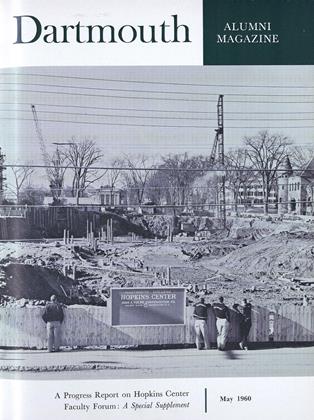TONY LUPIEN: This should be an interesting baseball team to watch. They won't score an awful lot of runs (as our low-scoring games down South proved) but they will be a good defensive club. They won't beat themselves.
Much depends on whether two seniors - Captain George (Woody) Woodworth and Chuck Kaufman - regain their sophomore form. On the vacation trip they did. Woodworth, who chews tobacco like Nellie Fox, is the best college catcher in New England, maybe the East, in my opinion. And he can hit well. Kaufman doesn't have a great swing but he's a fierce competitor, one of the best I've ever seen. He'll get that hit that hurts you.
At shortstop? Chuck has good hands. He and Roger McArt made as many double plays down South (five) as we did all last season. Dan Cilo, just out of the Marines, looks as though he'll give us some hitting in the outfield, but we're going to depend mostly on defense, it appears.
And pitching. The boys looked good on the mound during the southern trip. Don O'Neill is a control pitcher who won three and saved another. Bob VanDam is a sophomore, a little wild but fast. We lost a good lefthander, Dave French, but picked up footballer Roger Hanlon. Those three will be the bulwark of the staff.
Maybe I sound too optimistic. We did have a good southern trip though (5-5) and I like a good sound club in the field. Which this one appears to be.
PETE GARDNER: The long period of early practice demanded by rowing emphasizes Dartmouth's handicaps in trying to compete in crew, and the degree to which we have overcome these handicaps is the key to our hopes for this spring, and for our long-range position in the rowing fraternity. Although the crews race in April, May and June, the work done in February and March largely determines the results. The long and grueling practice period is usually overlooked by alumni, parents and friends.
The degree of teamwork required to be of championship caliber is unbelievable. It demands the precision of a crack drill team, which only mile after mile of rowing as a unit, with intense concentration, can give. Take one man out of a shell, replace him with another, and you have a new crew. It may be better or it may be worse, but it is definitely different. As a result, missing one man out of a boat in practice is virtually a day lost.
Another factor requiring time is conditioning. The races are long and grueling, demanding the utmost effort, but even more crucial is that the precision ingrained through practice may evaporate as the men get tired. When this happens it is like dropping an anchor. Precision has to be instilled to such an extent that the men row perfectly together even as they approach exhaustion.
Competing against crews that often are among the best in the world, such as Harvard and Yale, is a real challenge. Our river remains frozen over until April. Were we confined to rowing there alone, we could never hope to compete with any degree of success with the rest of the Ivy league. Luckily, however, just below Wilder Darn, only two miles from Hanover, there is a mile or two of open water the year around,' due to the swift flow of water and to its ever-changing level. There in shells protected by a fiberglass coating our crews are able to practice despite freezing weather.
When the temperature gets below 25 degrees, ice begins to build up on the oars, the riggers, and even on the men where they are splashed, making rowing almost impos- sible. There were also other problems such as having to row twelve crews in four shifts, the early nightfall, transportation to the dam area, and damage to the oars, which unfortunately don't lend themselves to being fiberglassed. However, despite this formidable series of obstacles, including the coldest March in years, all twelve crews rowed there from February 8 until March 17 when spring vacation allowed us to travel to milder bodies of water for two weeks of intensive training.
Now that spring has come, rowing is back to a normal basis on the river. If we do well in weekend races, and if some of our crews are good enough to rate consideration for a trip to Henley or the Olympic trials, it will be because of those miserable, icecoated, dark and discouraging days below the dam.
 View Full Issue
View Full Issue
More From This Issue
-
 Feature
FeatureThe Poetry of History: William Faulkner's Image of the South
May 1960 By HENRY L. TERRIE JR., -
 Feature
Feature"What We Are After"
May 1960 By EDWARD T. CHAMBERLAIN JR. -
 Feature
FeatureNATO in Trouble
May 1960 By H. WENTWORTH ELDREDGE '31, -
 Feature
FeatureThe Canadian Arctic Islands: North America's Last Petroleum Province?
May 1960 By ANDREW H. McNAIR, -
 Feature
FeatureHOPKINS CENTER: A Progress Report
May 1960 -
 Feature
FeatureTheatre Notables to Advise Center
May 1960







